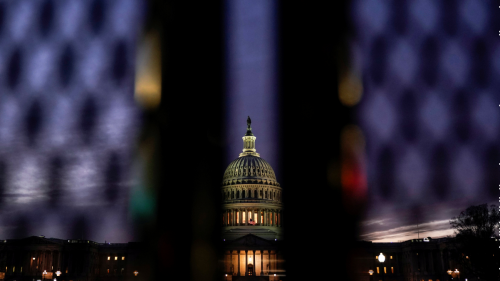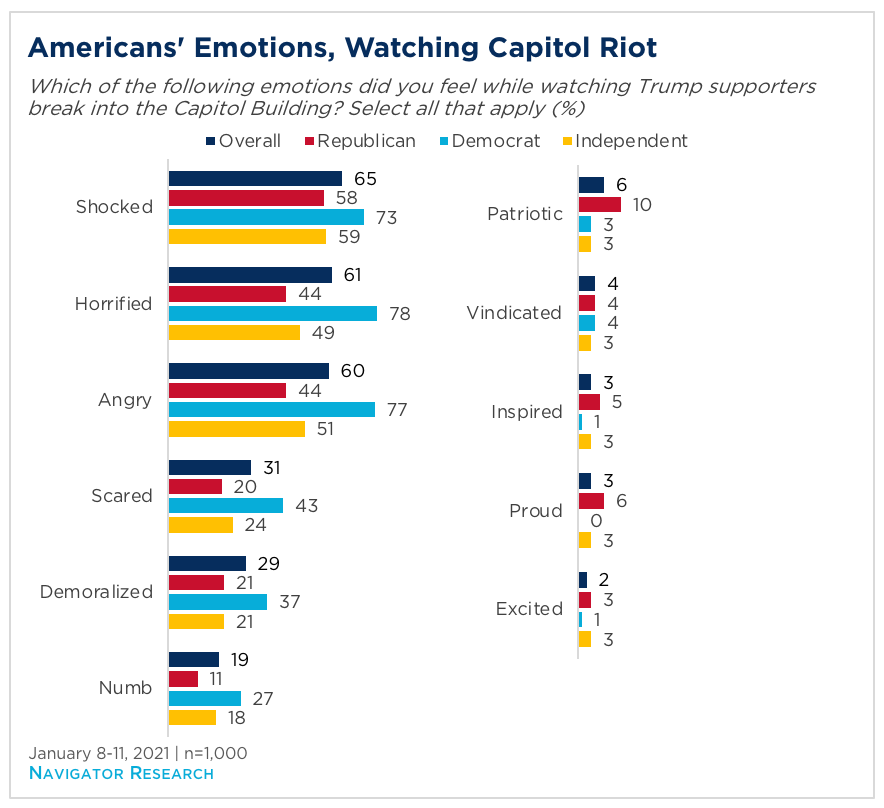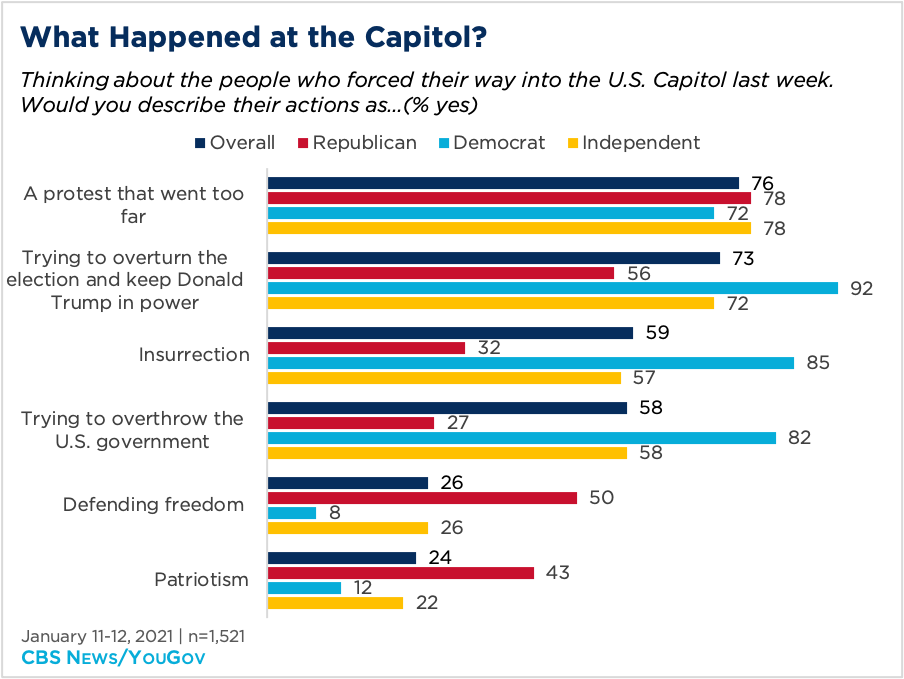Americans Condemn Capitol Riots; Reject Violence in Politics

Large majorities of Americans now disapprove of the attack on the US Capitol, but Democrats and Republicans disagree about what the rioters were aiming to do and what to do next.
As more information comes out about the January 6 assault on the US capitol by a mob of armed Trump supporters, the public mood is shifting rapidly, with large majorities disapproving of their actions and calling for their prosecution. But Democrats and Republicans disagree about what the rioters were aiming to do, and what to do next.
Americans Watch with Horror, Anger—and Want Rioters Prosecuted
Flash polls conducted the day of the event found that while most Americans opposed the actions of protesters, Republicans were divided. But as coverage of the events of January 6 continued, the public mood has turned hard against the Trump supporters who broke into the US Capitol, including among Republicans. Navigator Research polling finds that most Americans watched at least some coverage of the storming of the US Capitol (41% a lot, 31% some); majorities across party lines described themselves as shocked, watching the events unfold, with six in ten Americans saying they were horrified (61%) and angry (60%).

A PBS Newshour/Marist poll conducted January 7 finds nearly nine in ten Americans (88%) oppose the actions of the Trump supporters who broke into the US Capitol, including majorities across party lines (96% of Democrats, 86% of Independents, and 80% of Republicans). CBS/YouGov polling from January 11-12 similarly finds that 87 percent of Americans disapprove (70% strongly, 17% somewhat) of the actions taken by the people who forced their way into the US Capitol last week. That includes nearly all Democrats (96%), most Independents (85%), and eight in ten Republicans (79%).
The FBI is now searching for individuals involved in the January 6 riots, and along with the Justice Department, has launched a sedition and conspiracy task force to pursue charges against participants. PBS/Marist polling finds broad support for doing so among the public: nine in ten Americans (including 100% of Democrats, 88% of Independents, and 82% of Republicans) say that those who broke into the Capitol should be prosecuted.
What Happened on January 6? Majorities say a Protest—and an Insurrection
Shared disapproval of the rioters does not mean that Americans agree about what happened that day, or what the political consequences should be for the President in whose name they stormed the Capitol. Roughly three in four Americans describe the actions as a protest that went too far (76%) as well as an attempt to overturn the election and keep Donald Trump in power (73%). Majorities also describe their actions as insurrection (59%) and as an attempt to overthrow the US government.

But while most Americans agree that it was a protest gone wrong, beyond that, views are split strongly along party lines. Democrats are far more likely than Republicans to see the riot as an attempt to keep Donald Trump in power, and few Republicans describe what happened as an insurrection or an attempt to overthrow the government. Instead, half of Republicans (50%) say the rioters’ actions were defending freedom, and 43 percent say they were patriotic.
Nor is there agreement on the lawfulness of their actions. Per PBS/Marist polling, while seven in ten Americans (72%) say what happened was mostly people acting unlawfully, only half of Republicans (47%) agree. The same proportion of Republicans (47%) say that what happened was mostly a legitimate protest. Republicans and Democrats also disagree whether those who stormed the Capitol represent most Trump supporters or not. According to Huffington Post/YouGov polling, Americans overall (53%) and Democrats (79%) think they do, but only a third of Republicans agree (34%; 47% say they do not).
The public is also divided over how much blame the President bears for the actions of his supporters. PBS/Marist surveys find that six in ten Americans (63%, including 92% of Democrats and 62% of Independents), as well as 30 percent of Republicans, say that the President bears either a great deal or a good amount of blame for what happened at the US Capitol.
Public Rejects Use of Violence in Politics; Fears More Mobs
While question remain about how and why the Capitol Police were not prepared for the scale of the January 6 crowds, it is a mistake that clearly will not be repeated. Roughly 20,000 National Guard members are now deploying to Washington DC for the inauguration, in addition to forces from the US Secret Service, Capitol Police, and the District’s own police force. The rapid deployment means some guardsmen are sleeping in Capitol facilities—something last seen during the US Civil War.
The show of force is aimed to prevent any further outbreaks of violence. And CBS News/YouGov polls show that most Americans (80%) reject the use of violence in politics, saying that using force or violence to achieve political goals is always unacceptable. This rejection of violence is a bipartisan position, including large majorities of Democrats (87%), Republicans (74%), and Independents (79%).
Still, the public fears that violence will return again: three-quarters of Americans (74%) think it is likely that there will be more attempts at violence during the inauguration next week. A similar proportion (70%) oppose any efforts by Trump supporters to hold protests in DC next week, perhaps fearing another outbreak of mob violence. And HuffPost/YouGov polling from January 6-8 finds that a majority of Americans (54%)—including majorities of Democrats (64%) and Republicans (56%)—see the storming of the capitol as representing a broader movement in American society.
And as noted last week, the beliefs animating the January 6 riot have existed for some time. They persist after the riot as well. For one, the belief that the 2020 election was fraudulent remains prevalent among Republicans even as most Americans reject these theories. While two-thirds of Americans trust that the results of the 2020 election were accurate, per PBS/Marist polling, only a quarter of Republicans (25%) do. A Economist/YouGov survey conducted January 10-12 finds that while most Democrats (71%) have a great deal of confidence that the 2020 election was conducted fairly, half of Republicans (52%) say they have none at all. Most Republicans (67%) support the objections made by some Republicans in Congress to the certification of the election of Joe Biden as president, and seven in ten (70%) say a lot of voter fraud occurred – enough to change the results of the election (76%).
What Happens Next
With the House passing articles of impeachment on January 13, and the Justice Department opening wide-ranging investigations into the rioters, the consequences of the January 6 riots will have long-lasting impacts on the American political landscape. Stay tuned to Running Numbers for future updates on how public attitudes are changing.


